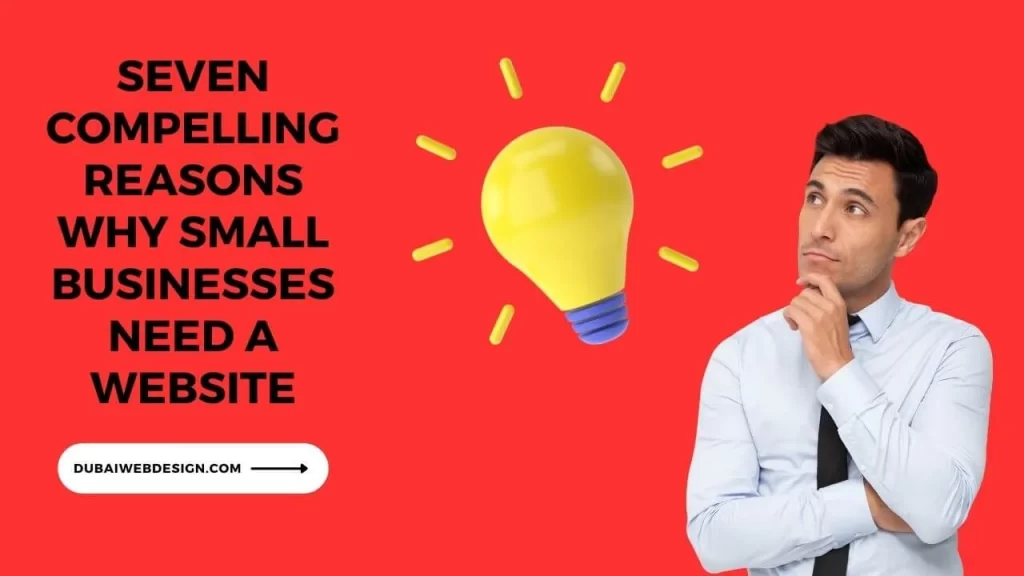7 Reasons Why Small Businesses Need a Website [2023]
You know you are living in 2023 fast and advanced era having a strong online presence is no longer an option. And especially true for small businesses striving to carve out their place in the market.
A well-designed and user friendly website can be a game-changer, providing numerous benefits that can drive growth and success.
Let’s delve into seven compelling reasons why small businesses need a website
7 Reasons Why Small Businesses Need a Website in 2023
1. Establishing Credibility and Professionalism
A website for small business free acts as a virtual storefront, welcoming potential customers and partners into your business world. In the absence of an online presence, small businesses might appear less credible and trustworthy.
A well-designed website with relevant information, high quality visuals, and customer testimonials communicates professionalism and establishes a positive first impression, encouraging visitors to engage with your brand.
A website offers an opportunity to tell your brand’s story, share your mission and vision, and provide evidence of your expertise. Customer testimonials, case studies, and an engaging About Us page can all contribute to building a sense of trust and credibility.
2. Expanding Your Reach Globally
One of the most significant advantages of a business to business website is its ability to transcend geographical boundaries. A physical store is confined to a specific location, but a website provides access to a global audience 24/7.
This expanded reach opens up new markets and opportunities, allowing small businesses to tap into previously unreachable customer segments and even consider international partnerships.
Your products and services become accessible to potential customers who might never have known about your business otherwise. This extended reach doesn’t just boost sales; it also opens doors to collaborations, partnerships, and growth opportunities that would have been unimaginable without an online presence.
3. Cost-Effective Marketing and Advertising
Are you wondering how to create a website for business for free? Traditional marketing methods like print ads, brochures, and billboards can be costly for small businesses with limited budgets.
A website offers a cost-effective alternative by providing a platform for digital marketing strategies such as search engine optimization (SEO), content marketing, social media promotion, and pay-per-click advertising.
These strategies enable you to target specific audiences and data-driven decisions to maximize your marketing efforts. A website levels the playing field by offering cost-effective marketing avenues.
Search Engine Optimization (SEO) techniques make your website more visible to potential customers when they search for relevant keywords on search engines like Google.
Content marketing, through blogs and articles, not only establishes your expertise but also draws organic traffic to your site.
4. Showcasing Products and Services
A website serves as a comprehensive catalog of your products and services. If you are wondering why small business need a website, then we will let you know about a secret.
It can help to showcase your offerings with high-quality images, detailed descriptions, and even videos, helping potential customers understand the value you provide.
This digital showcase enables customers to explore and compare options at their convenience, driving informed purchasing decisions.
High-resolution images, detailed descriptions, pricing information, and even customer reviews enable potential customers to make informed decisions.
A website design for small business should include interactive elements like product galleries, 360-degree views, and videos to provide an immersive experience, replicating the tactile experience of physically interacting with the product.
5. Enhancing Customer Engagement
Engagement is key to building strong customer relationships. A website can feature interactive elements such as contact forms, live chat, and comment sections that facilitate direct communication with visitors.
This direct line of interaction creates a personalized experience, where customers can seek information and allow you to make affordable websites for small business.
Customer engagement goes beyond merely making a sale. It’s about creating meaningful interactions that build trust and loyalty. A website facilitates this by providing avenues for direct communication.
Contact forms allow visitors to reach out with inquiries, while live chat services offer instant assistance.
6. Data Collection and Analysis
Websites offer invaluable insights into customer behavior and preferences. With tools like Google Analytics, small businesses can gather data on website traffic, user demographics, popular pages, and conversion rates.
This information helps refine marketing strategies, optimize website content, and tailor offerings to better suit customer needs. The power of data-driven decisions cannot be overstated in today’s competitive market.
In the digital realm, data is a goldmine. A website equipped with analytics tools is one of the best personal business website examples. It offers valuable insights into visitor behavior, preferences, and patterns.
You can track the number of visitors, where they’re coming from, which pages they’re spending the most time on, and even at what point they leave your site. Data-driven decision-making empowers you to stay ahead of the curve in a rapidly evolving market.
7. 24/7 Availability and Convenience
Unlike brick-and-mortar stores with fixed operating hours; a website is accessible around the clock. This convenience benefits both businesses and customers. Customers can explore your offerings, gather information, and even make purchases at their convenience.
For small businesses, this translates to a continuous stream of potential leads and sales, even when the physical store is closed.
Imagine a potential customer searching for your products or services at midnight, long after your physical store has closed for the day. Without a website, you’ve lost that opportunity.
A website operates 24/7, providing round-the-clock access to information, products, and services. This convenience not only accommodates diverse schedules but also caters to international customers in different time zones.
The Final Thoughts
In conclusion, many business owners wonder why a website need a website. A website is an indispensable tool for small businesses aiming to thrive in the digital age. It acts as a digital storefront, expanding your reach, establishing credibility, and providing a platform for cost-effective marketing.
With the ability to showcase products, engage customers, collect data, and offer round-the-clock convenience, a well-constructed website can catalyze growth and success for small businesses in today’s competitive market.
In the end, a website is more than just a digital billboard; it’s a versatile tool that empowers small businesses to thrive in the digital era. So, if you’re a small business owner, investing in a website is not just a good idea it’s a strategic imperative.




